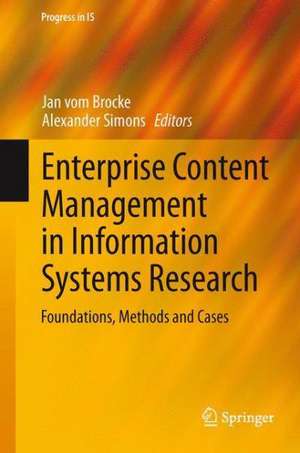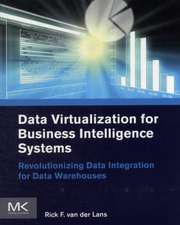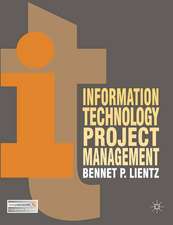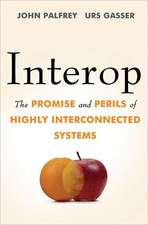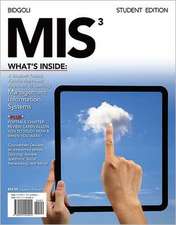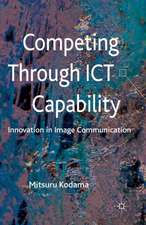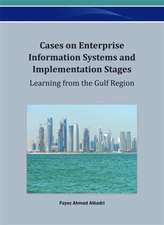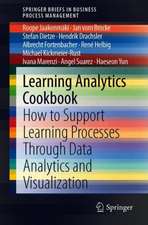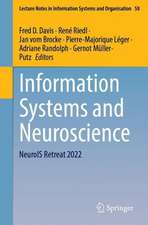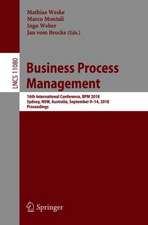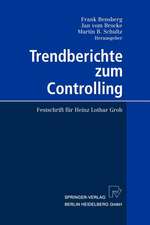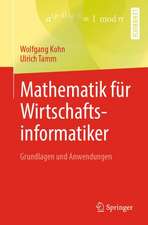Enterprise Content Management in Information Systems Research: Foundations, Methods and Cases: Progress in IS
Editat de Jan vom Brocke, Alexander Simonsen Limba Engleză Hardback – 15 noi 2013
“Enterprise content management in Information Systems research – Foundations, methods and cases” consolidates our current knowledge on how today’s organizations can manage their digital information assets. The business challenges related to organizational information management include reducing search times, maintaining information quality, and complying with reporting obligations and standards. Many of these challenges are well-known in information management, but because of the vast quantities of information being generated today, they are more difficult to deal with than ever.
Many companies use the term “enterprise content management” (ECM) to refer to the management of all forms of information, especially unstructured information. While ECM systems promise to increase and maintain information quality, to streamline content-related business processes, and to track the lifecycle of information, their implementation poses several questions and challenges: Which content objects should be put under the control of the ECM system? Which processes are affected by the implementation? How should outdated technology be replaced? Research is challenged to support practitioners in answering these questions.
| Toate formatele și edițiile | Preț | Express |
|---|---|---|
| Paperback (1) | 640.55 lei 6-8 săpt. | |
| Springer Berlin, Heidelberg – 23 aug 2016 | 640.55 lei 6-8 săpt. | |
| Hardback (1) | 646.75 lei 6-8 săpt. | |
| Springer Berlin, Heidelberg – 15 noi 2013 | 646.75 lei 6-8 săpt. |
Din seria Progress in IS
- 18%
 Preț: 1113.09 lei
Preț: 1113.09 lei - 15%
 Preț: 581.36 lei
Preț: 581.36 lei - 17%
 Preț: 360.70 lei
Preț: 360.70 lei - 18%
 Preț: 1113.09 lei
Preț: 1113.09 lei - 18%
 Preț: 725.43 lei
Preț: 725.43 lei - 15%
 Preț: 586.88 lei
Preț: 586.88 lei - 20%
 Preț: 939.27 lei
Preț: 939.27 lei -
 Preț: 395.25 lei
Preț: 395.25 lei -
 Preț: 385.62 lei
Preț: 385.62 lei - 24%
 Preț: 936.27 lei
Preț: 936.27 lei - 20%
 Preț: 566.19 lei
Preț: 566.19 lei - 20%
 Preț: 331.08 lei
Preț: 331.08 lei -
 Preț: 388.13 lei
Preț: 388.13 lei - 18%
 Preț: 795.02 lei
Preț: 795.02 lei - 15%
 Preț: 637.59 lei
Preț: 637.59 lei - 20%
 Preț: 547.09 lei
Preț: 547.09 lei - 24%
 Preț: 802.97 lei
Preț: 802.97 lei - 15%
 Preț: 644.30 lei
Preț: 644.30 lei -
 Preț: 385.25 lei
Preț: 385.25 lei - 18%
 Preț: 1251.68 lei
Preț: 1251.68 lei - 20%
 Preț: 314.39 lei
Preț: 314.39 lei - 20%
 Preț: 336.35 lei
Preț: 336.35 lei -
 Preț: 386.61 lei
Preț: 386.61 lei -
 Preț: 383.50 lei
Preț: 383.50 lei -
 Preț: 382.75 lei
Preț: 382.75 lei - 15%
 Preț: 644.95 lei
Preț: 644.95 lei - 15%
 Preț: 652.64 lei
Preț: 652.64 lei - 18%
 Preț: 954.62 lei
Preț: 954.62 lei - 18%
 Preț: 784.13 lei
Preț: 784.13 lei - 18%
 Preț: 726.69 lei
Preț: 726.69 lei - 15%
 Preț: 646.11 lei
Preț: 646.11 lei - 15%
 Preț: 636.80 lei
Preț: 636.80 lei - 20%
 Preț: 584.18 lei
Preț: 584.18 lei - 15%
 Preț: 658.55 lei
Preț: 658.55 lei - 15%
 Preț: 589.14 lei
Preț: 589.14 lei - 20%
 Preț: 986.01 lei
Preț: 986.01 lei -
 Preț: 421.34 lei
Preț: 421.34 lei - 20%
 Preț: 337.00 lei
Preț: 337.00 lei - 15%
 Preț: 644.95 lei
Preț: 644.95 lei - 19%
 Preț: 561.57 lei
Preț: 561.57 lei
Preț: 646.75 lei
Preț vechi: 760.88 lei
-15% Nou
Puncte Express: 970
Preț estimativ în valută:
123.81€ • 129.19$ • 103.79£
123.81€ • 129.19$ • 103.79£
Carte tipărită la comandă
Livrare economică 13-27 martie
Preluare comenzi: 021 569.72.76
Specificații
ISBN-13: 9783642397141
ISBN-10: 364239714X
Pagini: 300
Ilustrații: XII, 287 p. 36 illus.
Dimensiuni: 155 x 235 x 22 mm
Greutate: 0.59 kg
Ediția:2014
Editura: Springer Berlin, Heidelberg
Colecția Springer
Seria Progress in IS
Locul publicării:Berlin, Heidelberg, Germany
ISBN-10: 364239714X
Pagini: 300
Ilustrații: XII, 287 p. 36 illus.
Dimensiuni: 155 x 235 x 22 mm
Greutate: 0.59 kg
Ediția:2014
Editura: Springer Berlin, Heidelberg
Colecția Springer
Seria Progress in IS
Locul publicării:Berlin, Heidelberg, Germany
Public țintă
ResearchCuprins
Part A: Foundation and Trends.- Part B: Methods and Tools.- Part C: Examples and Cases.
Recenzii
From the book reviews:
“Part A of the book contains five chapters and provides a good overview of ECM. … Part B has also five chapters and provides more details about the implementation of ECM … . Part C is a case study of ECM for five different enterprises. … There are good references at the end of each chapter … . practitioners and students of ECM should find this book useful.” (E. Y. Lee, Computing Reviews, June, 2014)
“Part A of the book contains five chapters and provides a good overview of ECM. … Part B has also five chapters and provides more details about the implementation of ECM … . Part C is a case study of ECM for five different enterprises. … There are good references at the end of each chapter … . practitioners and students of ECM should find this book useful.” (E. Y. Lee, Computing Reviews, June, 2014)
Textul de pe ultima copertă
“Enterprise Content Management in Information Systems Research – Foundations, Methods and Cases” collects ECM research from the academic discipline of Information Systems and related fields to support academics and practitioners who are interested in understanding the design, use and impact of ECM systems. It also provides a valuable resource for students and lecturers in the field.
The book consolidates our current knowledge on how today’s organizations can manage their digital information assets. The business challenges related to organizational information management include reducing search times, maintaining information quality, and complying with reporting obligations and standards. Many of these challenges are well-known in information management, but because of the vast quantities of information being generated today, they are more difficult to deal with than ever.
Many companies use the term “ECM” to refer to the management of all forms of information, especially unstructured information. While ECM systems promise to increase and maintain information quality, to streamline content-related business processes, and to track the lifecycle of information, their implementation poses several questions and challenges: Which content objects should be put under the control of the ECM system? Which processes are affected by the implementation? How should outdated technology be replaced? Research is challenged to support practitioners in answering these questions.
The book consolidates our current knowledge on how today’s organizations can manage their digital information assets. The business challenges related to organizational information management include reducing search times, maintaining information quality, and complying with reporting obligations and standards. Many of these challenges are well-known in information management, but because of the vast quantities of information being generated today, they are more difficult to deal with than ever.
Many companies use the term “ECM” to refer to the management of all forms of information, especially unstructured information. While ECM systems promise to increase and maintain information quality, to streamline content-related business processes, and to track the lifecycle of information, their implementation poses several questions and challenges: Which content objects should be put under the control of the ECM system? Which processes are affected by the implementation? How should outdated technology be replaced? Research is challenged to support practitioners in answering these questions.
Caracteristici
Provides a research perspective on ECM that is oriented towards bridging the gap between ECM research and practice Takes a holistic view of ECM research, covering the foundations and methods of ECM implementation and offering sample applications Connects technological and managerial research on ECM, involving not only technologies, but also strategies, methods, and processes Includes supplementary material: sn.pub/extras
